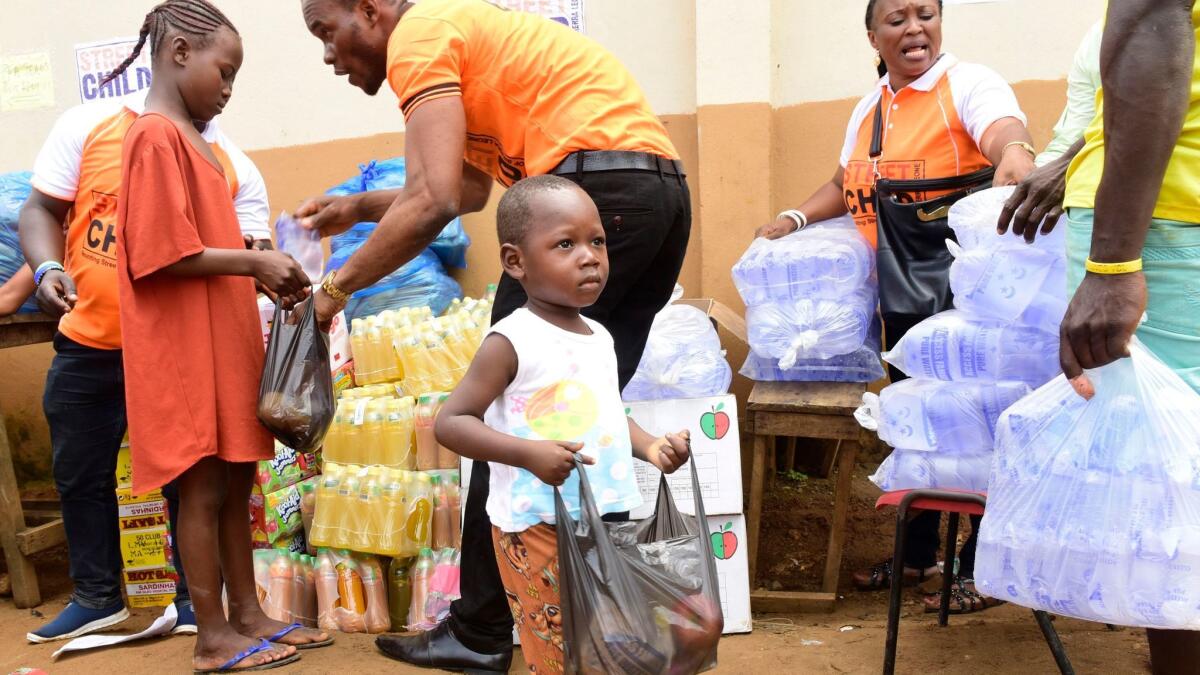With more rain on the way, death toll in Sierra Leone mudslides rises to more than 450

- Share via
Reporting from FREETOWN, Sierra Leone — Survivors picking through the debris of Sierra Leone’s deadly mudslides were facing the reality Saturday that most, if not all, of the hundreds of people missing are dead, as relief and aid efforts intensified.
The death toll is already above 450 from the flooding and mudslides in the capital, Freetown, early Monday.
The number of missing could go higher than 600, according to Sierra Leone’s deputy minister of information and communications, Cornelius Deveaux.
Satellite images and census figures are being used to calculate a more accurate human toll.
Rescue officials have warned that the chances of finding survivors “are getting smaller every day.”
Large-scale burials that began this week amid rainy weather continued amid the threat of further mudslides.
The government of the impoverished West African nation has warned residents to evacuate a mountainside where a large crack has opened. Authorities have told journalists that thousands of people live in areas at risk, and the main focus is making sure they leave before further disaster.
The government plans to relocate those affected to temporary, and eventually permanent, shelters.
Deveaux said the government was mindful of the possible outbreak of health emergencies. Aid groups have been providing water filters, buckets, water storage tanks, soap and hygiene supplies.
At least 122 of the victims are children, and a similar number have been orphaned by the disaster, the aid group Save the Children said.
Sayo Jalloh, who lost a son, a brother and 15 other family members, has been too numb to mourn. At a camp for those made homeless in the hard-hit Regent neighborhood, she has been having trouble sleeping and pleads with her traumatized daughter to eat.
“I just keep wondering why I don’t see them or even dream about them,” she said of her lost relatives. “It just seems like when someone has traveled. I can’t even locate the house where I used to live anymore, other than to just point at the area.”
Burials have begun in a cemetery that holds victims of the 2014-15 Ebola outbreak that killed thousands in the West African country.
Many people have been unable to find loved ones, and victims often are too mangled and decomposed to be identified. But the government has vowed to hold burials for all.
Some critics accuse the government of not learning from past disasters in a city where many poor areas are near sea level and lack good drainage. The capital also is plagued by unregulated construction on its hillsides.
Some parts of the capital are without clean drinking water because of damage to pipelines. Malaria is also a concern, as many of the estimated 3,000 homeless are sleeping without mosquito nets.
Jalloh and her surviving family members are among them.
“I am just imagining where we live now — on empty ground? My body is paining me,” she said.
ALSO
The murder of a beloved anti-poaching crusader steels the resolve of fellow conservationists
How a London PR firm was forced to apologize for sowing racial division in South Africa
Horrifying images on social media fuel tension after Kenya’s disputed election, but not all are real
UPDATES:
5:20 p.m.: This article was updated to report that officials fear the death toll from mudslides could hit 600.
This article was originally published at 3:25 a.m.
More to Read
Sign up for Essential California
The most important California stories and recommendations in your inbox every morning.
You may occasionally receive promotional content from the Los Angeles Times.













